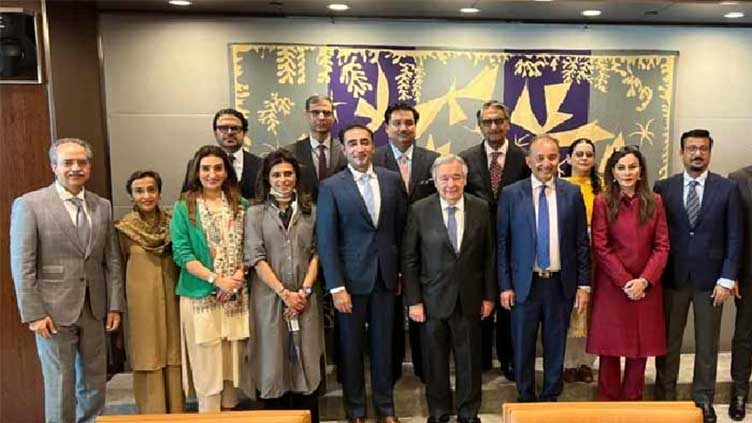Bilawal informs the UN chairman that India’s aggressive stance jeopardizes regional stability.

A Pakistani delegation, headed by Bilawal Bhutto Zardari, convened with UN Secretary-General António Guterres at the UN Headquarters in New York, requesting the United Nations to play an active role in alleviating tensions between Pakistan and India and in reinstating the Indus Waters Treaty, which New Delhi suspended unilaterally.
In a high-level meeting with UN Secretary-General António Guterres at the UN Headquarters in New York, Bilawal Bhutto Zardari urged immediate international action to avert further escalation in South Asia.
He stated that India’s recent military provocations and unfounded allegations subsequent to the Pahalgam attack in Indian unlawfully occupied Jammu and Kashmir (IIOJK) on April 22 threaten to exacerbate regional instability.
The former foreign minister, accompanied by a nine-member high-level parliamentary delegation, is presently in New York, USA, for a two-day visit to articulate Pakistan’s position regarding the recent armed conflict with India and to contest New Delhi’s narrative on the international stage.
The parliamentary delegation included Hina Rabbani Khar, Sherry Rehman, Dr. Musadik Malik, Khurram Dastgir Khan, Jalil Abbas Jilani, Tehmina Janjua, Bushra Anjum Butt, and Syed Faisal Subzwari.
Bilawal, head of the parliamentary delegation from Pakistan, presented a letter from Prime Minister Shehbaz Sharif to Guterres.
The premier’s letter articulated Pakistan’s apprehensions on India’s recent activities, encompassing cross-border assaults and harm to civilian infrastructure.
He also condemned India’s move to suspend the Indus Waters Treaty, seeing it as a manifestation of a “water war” against Pakistan.
He implored the Secretary-General to utilize his diplomatic influence to alleviate tensions, reinstate the normal operation of the Indus Waters Treaty, and foster an extensive dialogue between Pakistan and India—especially regarding the Jammu and Kashmir conflict, which is pivotal for achieving enduring peace in South Asia.
He emphasized that the resolution of the Kashmir problem remains an unresolved topic of the United Nations.
He stated, “The populace of South Asia merits tranquility, not conflict,” cautioning that India was endeavoring to establish a perilous “new normal” characterized by impunity and aggression.
The former Foreign Minister asserted that India employed force and unilateral measures that contravene international law and the UN Charter. He stated, “India’s actions jeopardize the tenuous peace in the region,” while reiterating Pakistan’s dedication to diplomacy and responsible conduct.
Bilawal emphasized the humanitarian repercussions of India’s cessation of the Indus Waters Treaty implementation, which he asserted jeopardized millions of lives. “This extends beyond mere water,” he said. “It pertains to survival.”
Bilawal expressed significant apprehensions regarding India’s perilous precedent of weaponizing water, deeming it a severe breach of international obligations and a menace to regional stability. He characterized the deal as “a vital support for 240 million Pakistanis.”
He informed the Secretary-General that the weaponization of water is intolerable and urged the United Nations to facilitate the restoration and complete implementation of the treaty.
Secretary-General Guterres endorsed Pakistan’s appeal for peace and reaffirmed the UN’s dedication to dialogue and the amicable resolution of conflicts. He stated that the United Nations continues to be actively involved in facilitating de-escalation efforts in South Asia.